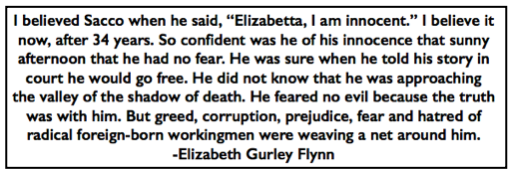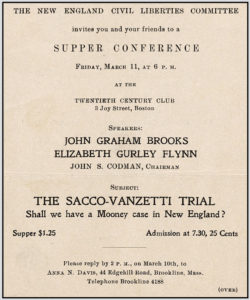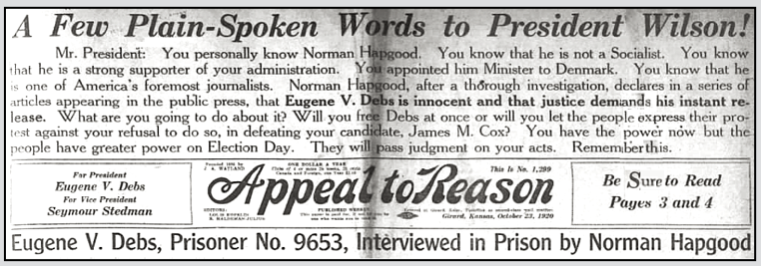 ———-
———-
Hellraisers Journal – Monday March 14, 1921
Boston, Massachusetts – Elizabeth Gurley Flynn Speaks for Sacco and Vanzetti
From The Boston Daily Globe of March 12, 1921:
MISS FLYNN RAPS “RED” HYSTERIA
———-
Criticises Method Used in
Prosecuting “Holdup Men”
———-
Asks Twentieth Century Club if
Justice Is Being Done Immigrants
———
In defending Nicola Sacco and Bartolomeo Vanzetti, the two Italians who are to be tried for the murder and robbery of a paymaster in East Braintree some months ago, Elizabeth Gurley Flynn, at the Twentieth Century Club last night [March 11th], denounced the methods used in prosecuting them, warmly upheld the foreign born workmen, or their children, as the victims of gross misconceptions among the so-called “American” population, excoriated this same attitude as unjustified, stupid and cruel-the product of fear and the “Red” hysteria.
Miss Flynn spoke before the New England Civil Liberties Committee.
[Said Miss Flynn:]
If a man is active in the labor movement and is trying to bring about better working conditions in industry, we have been taught to look behind charges brought against him. The Mooney case taught us to investigate before conviction, not afterward. We are willing to assume that men interested in labor movements are not of the criminal type.
That may not be a good reason in law, but it is perfectly true. No one with a studious, thoughtful mind can on the spur of the moment plan a crime requiring the skill of practiced criminals.
Touching on the popular prejudice against the alien element, she said she had read a sketch by Owen Wister, in which Mr. Wister compared aliens to guests within our house, who. if they did not like our ways, are privileged to leave, but not privileged to break up our home.
[She said:]
Yes, but they are not guests who sit in the parlor playing the piano while we are out in the kitchen doing the work. Not by a good deal. We are sitting in the parlor and they are washing the dishes, scrubbing the floor, fixing the furnace and doing all the drudgery we can load on them. If they were really guests we might expect them to reciprocate; but we expect them to do all the work and have nothing to say about the conditions under which they do it.
John S. Codman presided.
———-
[Invitation and emphasis added.]


 ———-
———-